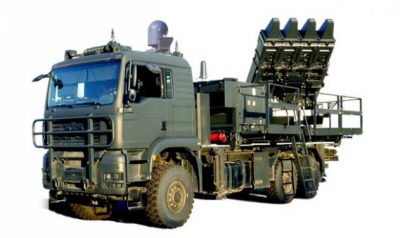Vietnam Has Buyer’s Remorse after Purchasing “Israeli” Anti-Air Missiles

Vietnam claims that “Israel’s” SPYDER surface-to-air missiles malfunction in tropical environments such as its own and importantly aren’t compatible with its majority-Russian-provided military wares, auguring quite negatively for the self-proclaimed “Jewish State’s” ambitions to expand its influence across the wider “Global South” by means of “military diplomacy” and possibly leading to it eventually falling from its position as the world’s tenth-largest weapons exporter if India soon gets cold feet about its own purchases too.
An unnamed Vietnamese military source told the well-regarded Russian international media outlet TASS that his country was considering abandoning its plans to purchase more of “Israel’s” SPYDER surface-to-air missiles after they reportedly malfunctioned in the country’s tropical environment, which comes just days after India voiced similar concerns about its newfound military-strategic partner’s anti-tank Spike missiles for the exact same reason. In the course of half a decade, “Israel” rose to become the world’s tenth-largest weapons exporter during the five-year period between 2012-2016 according to the Stockholm International Peace Research Institute (SIPRI), which noted that 41% of the self-proclaimed “Jewish State’s” sales were to India.
In the event that the US-allied South Asian aspiring hegemon gets cold feet and decides to curtail its purchases of “Israeli” military equipment following Vietnam’s lead, then this could deal a powerful blow to Tel Aviv’s ambitions to expand its influence across the wider (largely tropical) “Global South” by means of “military diplomacy”. The possible consequences of this is that “Israel” would have to prioritize its agricultural and hydrological expertise instead of its military exports if it wants to continue making more inroads in Africa, where it’s trying to become an observer in the African Union as part of its policy of diversifying its previously Western-dependent international relationships.
As for India, it might compensate for the fewer arms purchases that it could make from its previously third-largest military supplier by looking towards its first- and second-largest ones of Russia and the US, respectively, instead. This could see it trying to play each of these rivals off against the other to its ultimate benefit, something that Vietnam is ill-equipped to do because SIPRI notes in the same aforementioned report that it depends on Russia for a whopping 88% of its weapons imports. Hanoi could, however, still look towards the US, but both it and New Delhi would nevertheless have the same issue of American wares not being compatible with their existing Russian ones.
Therein lays the larger problem at play, and it’s that military diversification is a lot more difficult to pull off in practice than it is to promulgate as a political policy, seeing as how such a gradual shift carries with it inherent challenges related to a lack of interoperability and the consequent strategic vulnerabilities that this creates in the prolonged transitional period. For as much as India wants to replace Russian military equipment with the West’s, as it’s proven to be doing and which earned it a CAATSA sanctions waiver from the US for its purchase of the S-400s, it just simply can’t afford to do this at a rapid pace, nor can Vietnam.
India might have been impressed by “Israeli” military equipment and also thought that purchasing more of it could solidify the strategic partnership between the two that was on full public display during Prime Minister Modi’s trip to the so-called “Jewish State” in summer 2017, but just like Vietnam’s quickly realizing, New Delhi might also be experiencing buyer’s remorse after finding out that some of it isn’t so impressive in a tropical environment and obviously isn’t compatible with its Armed Forces mostly-Russian-supplied equipment. This unexpected realization makes one wonder whether “Israel” knew about its products’ faults all along and was misleading its customers or if its military is really so incompetent that they hadn’t the slightest clue until now.
*
Note to readers: please click the share buttons above. Forward this article to your email lists. Crosspost on your blog site, internet forums. etc.
This article was originally published on Eurasia Future.
Andrew Korybko is an American Moscow-based political analyst specializing in the relationship between the US strategy in Afro-Eurasia, China’s One Belt One Road global vision of New Silk Road connectivity, and Hybrid Warfare. He is a frequent contributor to Global Research.

